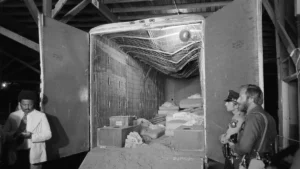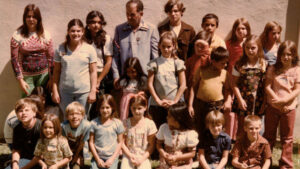Chowchilla (2023) review
Dir. Paul Solet
By: Steve Pulaski
Rating: ★★★
The new documentary Chowchilla — a collaborative work between CNN Films and HBO — recalls July 1976 in the titular town, a sleepy farm community located in Central California. Out of the blue, a school bus carrying 26 children (and their adult driver) was hijacked. The victims were ushered by the hijackers into two separate vans, driven to a rocky quarry, and essentially buried alive in an underground truck trailer loaded with mattresses. It’s the stuff of a Stephen King novel, or an inexplicable nightmare that shocks you awake in a cold sweat.
If you’re unfamiliar with the story, it’s best to go into Paul Solet’s documentary blind. The term “happy ending” applies to this bizarre kidnapping saga in a nebulous way. Everyone on the bus survived the incident, but many were left emotionally and mentally scarred. Chowchilla lets the children, now middle-aged-to-elderly adults, recount the story in their own words while also speaking about the unquantifiable trauma they’ve experienced since.
The documentary also permits Mike Marshall, who was 14-years-old at the time of the kidnapping, and one of the oldest students on that bus, to tell his side of the story. As an adult, Marshall is a humble human being to his core, which is probably why it takes all of his energy to elaborate on how he was the one who scratched and clawed his way out of the submerged trailer and helped his friends to safety (a story corroborated by many, if not all in the film). Marshall didn’t receive any credit at the time; most went to the bus driver, Ed Ray, not unjustly, but disproportionately. Ray kept the kids composed. Marshall saved their lives.
Unfortunately, many of their lives would become negatively impacted by those harrowing 36 hours spent helpless. Many, including Marshall, dealt with nightmares and emotional paralysis. Some turned to drugs and alcohol. Late in the doc, Lenore C. Terr, the psychiatrist and trauma expert for the children at the time, explains how the Chowchilla students were pioneers of sorts, their stories and subsequent difficulties contributing to research in the then-nonexistent field of childhood trauma. These days, with copious school shootings, counselors are typically on-site in the wake of tragedies. In the fall of 1976, the Chowchilla kids were taken to Disneyland. What better medicine for a child that experienced the unspeakable than “the happiest place on Earth?”

Another victim discusses how she could never escape the “stigma” that came with being one of the kidnapped. Well into her teenage years, she was routinely prodded about the incident to the point where she recalls being overjoyed when her parents told her they were moving to a new community. She could finally be a “nobody.” The surviving son of another victim talks about how his mother descended into addiction, the invisible scars effectively making her a shell of her former, peppy self. His testimony is liable to put you in tears. Especially if you’ve witnessed something of the sort in your own family member(s).
Chowchilla chronicles all of this in a brisk 98-minutes and still finds time to talk about who was behind the kidnapping. The ringleader of the operation, Frederick Woods, was a rich brat whose family owned Magic Mountain. Him and his two partners sought $5 million in ransom money, although the circumstances that transpired before they were able to demand the funds is quietly funny in itself. Simply put, they were three entitled wealth babies inspired by Dirty Harry to commit a contemptible crime. The three would likely remain in prison had this crime occurred in any of the other 49 states. Unfortunately, this just had to occur in California, likely the only state where, decades later, politicians would question whether to uphold the kidnappers’ “bodily harm” conviction when the students had “no physical injuries.” Solet’s film chronicles the parole hearings for the three and the subsequent fight from the victims to keep them behind bars.
Separating the compelling and important story from the documentary’s quality, Chowchilla is accomplished for a handful of reasons. It’s made fiercely watchable thanks to Solet’s divine use of archival footage, as well as its desire to tell this story with an intense focus on childhood trauma. However, it sometimes feels like the filmmakers were assigned the hour-and-38-minute runtime before they began work on the film, resulting in certain chapters of this story feeling rushed and thereby left with questions unanswered.
HBO found great success with their three-part docuseries The Murders at Starved Rock both in quality and structure. That treatment might’ve done this story better justice in assuring that all the complicated aspects within it would’ve been better developed.
NOTE: Chowchilla is available to stream on Max.
Directed by: Paul Solet.
About Steve Pulaski
Steve Pulaski has been reviewing movies since 2009 for a barrage of different outlets. He graduated North Central College in 2018 and currently works as an on-air radio personality. He also hosts a weekly movie podcast called "Sleepless with Steve," dedicated to film and the film industry, on his YouTube channel. In addition to writing, he's a die-hard Chicago Bears fan and has two cats, appropriately named Siskel and Ebert!


